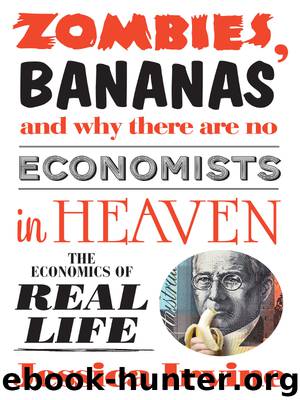Zombies, Bananas and Why There Are No Economists in Heaven by Jessica Irvine

Author:Jessica Irvine
Language: eng
Format: epub
Tags: BUS069000, book
ISBN: 9781742697772
Publisher: Allen & Unwin
Published: 2012-07-23T16:00:00+00:00
Like being on a
rollercoaster in the dark
13 August 2011
The thing about humans is we often search for reason where there is none. Economists are notorious for it. So enamoured was the profession in the 1970s with the concept of rationality, economists developed the idea of the ‘efficient markets hypothesis’. This states that, at any point, financial market pricing reflects all available information and hence is the best possible guide to the value of economic assets. Some particularly ardent advocates take it a step further, arguing that, because share traders also take into account future developments, the present share price of a company must also be the best estimate of its future value. Information being free, and market participants entirely rational, economists concluded that market bubbles were impossible and that governments should not intervene to regulate financial markets.
The global financial crisis cast this theory asunder. Asset bubbles do indeed happen and where governments fail to regulate financial markets, lies, distortions and misinformation prosper.
But while most economists have fallen out of love with the idea that financial markets are efficient, we in the media still seem in its thrall. When shares fall suddenly, we immediately search for deeper meaning. ‘Shares tumble as likelihood of US recession rises,’ we conclude. Two minutes later, as shares rise, we conclude the opposite: ‘Shares soar as recession risks recede’.
If we’re more investigative, we call share traders to try to figure out which particular rumour is preoccupying their minds. ‘Shares rise amid rumours of QE3,’ we conclude. (QE3 meaning ‘quantitative easing round three’, or another round of the US Federal Reserve printing money to stimulate growth.) But let’s face it, in the short term at least, the real reason share prices rise or fall is more mechanical. When there are more buyers in the market willing to pay a higher price, prices rise. When there are more sellers in the market willing to sell at a lower price, prices fall. Of course, for every seller there must be a buyer, and vice versa. So the term ‘sell-off’ is a bit misleading, implying that only selling is occurring. Who buys shares when prices are falling? Mainly, strategic bargain hunters or large institutional investors, such as super funds.
Unfortunately, the headline ‘Shares soar as more people willing to buy’ isn’t very exciting, nor does it satisfy our deep yearning for meaning. Because, while in the short term share-price fluctuations display all the orderly progression of a stampeding herd, in the long run shares should reflect some more fundamental information about likely profit growth.
Download
This site does not store any files on its server. We only index and link to content provided by other sites. Please contact the content providers to delete copyright contents if any and email us, we'll remove relevant links or contents immediately.
| Arms Control | Diplomacy |
| Security | Trades & Tariffs |
| Treaties | African |
| Asian | Australian & Oceanian |
| Canadian | Caribbean & Latin American |
| European | Middle Eastern |
| Russian & Former Soviet Union |
The Secret History by Donna Tartt(19090)
The Social Justice Warrior Handbook by Lisa De Pasquale(12190)
Thirteen Reasons Why by Jay Asher(8910)
This Is How You Lose Her by Junot Diaz(6887)
Weapons of Math Destruction by Cathy O'Neil(6281)
Zero to One by Peter Thiel(5802)
Beartown by Fredrik Backman(5755)
The Myth of the Strong Leader by Archie Brown(5508)
The Fire Next Time by James Baldwin(5446)
How Democracies Die by Steven Levitsky & Daniel Ziblatt(5219)
Promise Me, Dad by Joe Biden(5153)
Stone's Rules by Roger Stone(5088)
A Higher Loyalty: Truth, Lies, and Leadership by James Comey(4964)
100 Deadly Skills by Clint Emerson(4926)
Rise and Kill First by Ronen Bergman(4789)
Secrecy World by Jake Bernstein(4753)
The David Icke Guide to the Global Conspiracy (and how to end it) by David Icke(4720)
The Farm by Tom Rob Smith(4514)
The Doomsday Machine by Daniel Ellsberg(4490)
